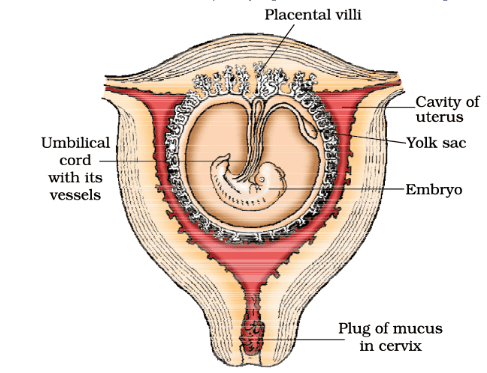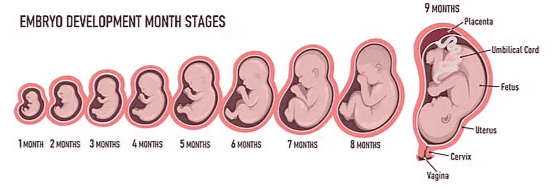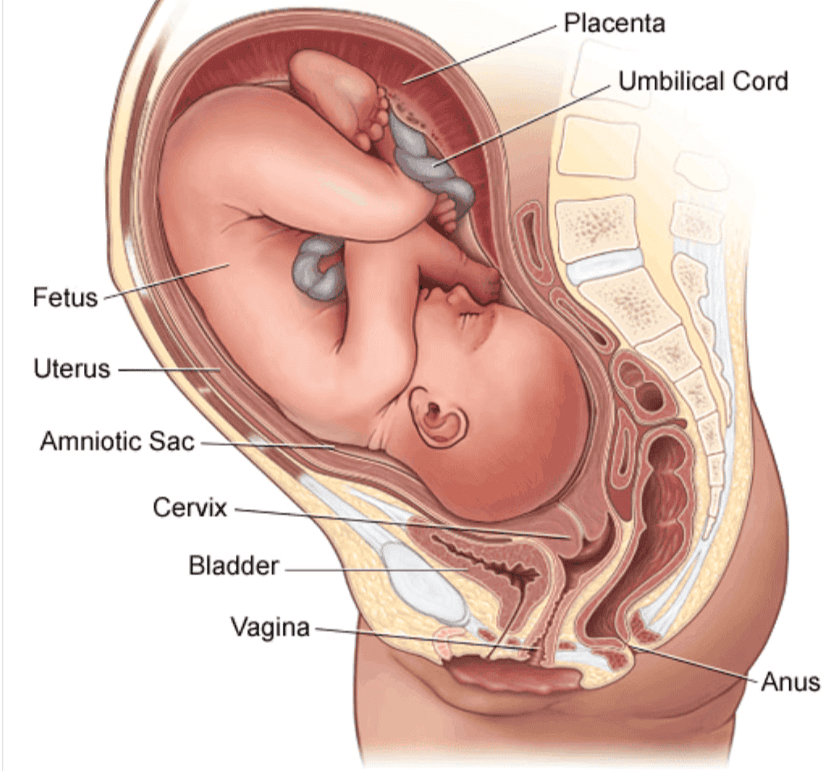Pregnancy & Embryonic Development | Biology Class 12 - NEET PDF Download
Let's Study in Detail About Pregnancy and Embryonic Development

- After implantation, the trophoblast develops finger-like projections known as chorionic villi, which become surrounded by uterine tissue and maternal blood.
- The chorionic villi interdigitate with the uterine tissue, forming a structural and functional unit called the placenta. The placenta serves as a crucial interface between the developing embryo (fetus) and the maternal body, facilitating the exchange of oxygen, nutrients, carbon dioxide, and waste materials.
- The placenta is connected to the embryo via the umbilical cord, which aids in the transport of substances to and from the embryo. Additionally, the placenta functions as an endocrine organ, producing important hormones such as human chorionic gonadotropin (hCG), human placental lactogen (hPL), estrogens, and progestogens. Later in pregnancy, the ovary also secretes a hormone called relaxin.
- During pregnancy, hormones like hCG, hPL, and relaxin are produced only in women, while levels of other hormones such as estrogens, progestogens, cortisol, prolactin, and thyroxine increase significantly in the maternal blood. This hormonal surge is essential for supporting fetal growth, maternal metabolic changes, and maintaining pregnancy.
Shortly after implantation, the inner cell mass (embryo) differentiates into three primary germ layers:
- Ectoderm(outer layer)
- Endoderm(inner layer)
- Mesoderm(middle layer, which appears soon after the ectoderm and endoderm)
These three layers give rise to all the tissues and organs in the adult body. The inner cell mass also contains stem cells, which have the potential to develop into any type of tissue or organ.
Major Features of Embryonic Development at Various Months of Pregnancy

Human pregnancy typically lasts for 9 months. Here's an overview of the major features of embryonic development during different months of pregnancy:
- First Month: The embryo's heart starts to form. The first sign of a growing fetus may be detected by listening to the heart sound through a stethoscope.
- Second Month: The fetus develops limbs and digits.
- By 12 Weeks (First Trimester): Most major organ systems are formed. The limbs and external genital organs are well-developed.
- Fifth Month: The first movements of the fetus are usually observed, and hair begins to appear on the head.
- By 24 Weeks (End of Second Trimester): The body is covered with fine hair, and the eyelids separate with the formation of eyelashes.
- By Nine Months: The fetus is fully developed and ready for delivery.

Different animals have varying lengths of pregnancy. For example:
- Dogs: Pregnancy lasts about 2 months.
- Elephants: Pregnancy lasts about 22 months, which is one of the longest in the animal kingdom.
- Cats: Pregnancy lasts about 2 months, similar to dogs.
|
59 videos|290 docs|168 tests
|
FAQs on Pregnancy & Embryonic Development - Biology Class 12 - NEET
| 1. What are the stages of embryonic development during pregnancy? |  |
| 2. How does pregnancy affect a woman's body? |  |
| 3. What are common signs of early pregnancy? |  |
| 4. What is the importance of prenatal care during pregnancy? |  |
| 5. What are the potential risks during embryonic development? |  |

















